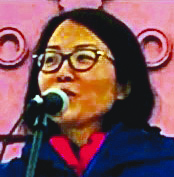Education is key to fighting hatred
Editor’s Note: In honor of Asian American and Pacific Islander Heritage Month, we asked some of the speakers at the recent rally against violence against people of Asian descent to submit their speeches as columns. This week’s column is from Dr Joon K.Shim, the program director for Bassett’s Medical Center’s General Surgery Residency Program.

I am grateful for the opportunity. Thank you for coming. It’s Asian American heritage month. Stand tall and be proud. My message today is a prayer for hope.
I like to talk to you about the term Asian Americans. Many people think Chinese is synonymous for Asians the same way Kleenex is for tissues. Many people don’t understand that we’re a spectrum of many different nationalities. There are so many qualifications weighing the “we” in Asian America. It’s a unique condition that’s distinctly Asian.
There is the stereotype of the “Asian nerd”—a tech geek, good at math and science, but socially awkward and passive. But Asian Americans are struggling economically like many other Americans. Asian Americans are struggling with staggering unemployment and Asian Americans accounted for nearly 40% of Covid-19 deaths in San Francisco.
Then there is the stereotype of an Asian woman, portrayed as exotic and beautiful, but also submissive, obedient, and fragile. Furthermore, Asian Americans are often treated as “perpetual foreigners” and always being asked, “Where are you really from?”
I was born in South Korea and I immigrated to this country when I was six years old with my family in 1984. For most of my teenage life in New Jersey, I felt invisible even as I assimilated.
At that time, I didn’t understand the significance of the hyphen between the words Asian and American. And it’s this complex space that we’re talking about today.
Who is Asian American? Who is us? What is us? Is there even a concept as an Asian American consciousness?
Today I am no longer invisible – I am a Veteran. I am the Trauma Medical Director at Bassett. I am a surgeon. I am an educational leader and an agent of change. I am proud to call myself an American.
In the last two months, Koreans, Chinese, Sikhs, and Vietnamese Americans have all been traumatized because they look different. Even a Filipino woman going to church on Easter had been traumatized because she looked different.
Anti-Asian prejudice and hate crimes have a long history in the United States but have been often overlooked and underreported. The COVID-19 pandemic has served to highlight and bring to our attention.
This can no longer be tolerated.
Today I am here to ask you to build our foundation in Cooperstown. A foundation of kindness with curiosity.
The curiosity to see that not all Asians are the same, just like every body else.
The curiosity to correctly pronounce Asian names and to embrace the difference with kindness, curiosity and humility. It does not have to be perfect. Just try and it will make a difference to your Asian friends and people you meet. And even ask people – how do you pronounce your name? In medicine, we call this cultural humility.
And in this process, discover that we are different and unique.
And in this process, discover that everyone wants to be happy. Everyone wants to feel safe and be somewhere that they belong.
Adding curiosity to kindness, we can discover and build bridges for mutual understanding.
The Korean word “jeong” is untranslatable but the closest definition is “an instantaneous deep connection.”
What can you do now? It all starts with education. Go to our own Cooperstown’s Fenimore Art Museum, there is an exhibit called Manzanar: The Wartime Photographs of Ansel Adams. There is an amazing exhibit about the concentration camps where Japanese American were placed in during WW II.
I invite you to critically examine your own perceptions and implicit bias towards others.
Consider taking some kind of ally training like “bystander intervention training.”
Again, I want to thank you for allowing our voices to be seen, heard and supported. Having you here today in the rain gives me hope for a better future.
As Mary Oliver wrote, “to pay attention, this is our endless and proper work.”

